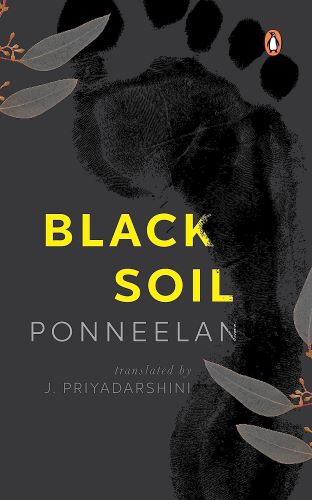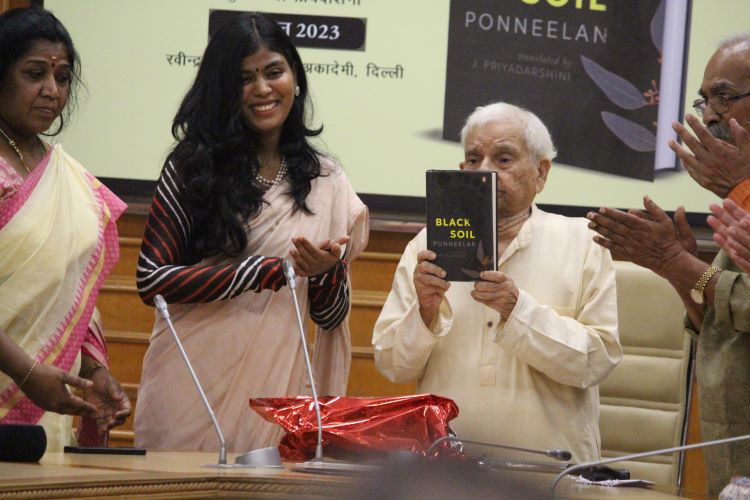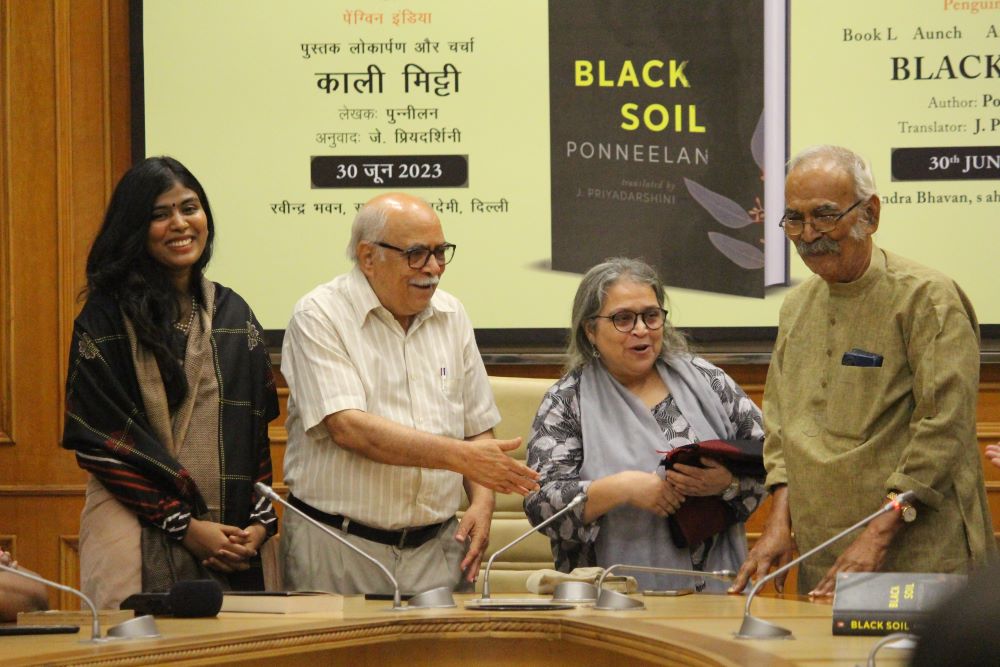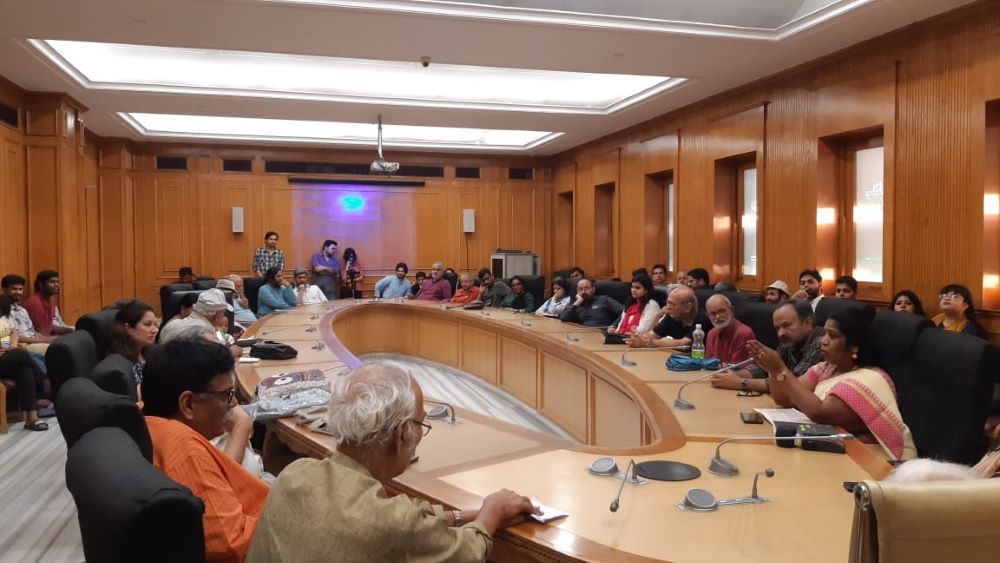
Authored by eminent Tamil writer Ponneelan, the book paints a moving portrait of life in a Tamil Nadu rural village when caste prejudice was widespread
Sindh Courier
New Delhi
The launching ceremony of the book ‘Black Soil’, the English translation of the famous Tamil novel ‘Karisal’ was held recently in Delhi. The author of the book is legendary Sahitya Akademi awardee Tamil writer Ponneelan. The book was released by renowned Hindi writer Prof. Vishwanath Tripathi.
The book has been translated into English by Dr. J. Priyadarshini and published as Karisal, originally in Tamil. It bears the atrocities farmers face and the human cost of their struggles.
 According to Indian media, the English translation of Tamil novel Karisal, has hit the stands at a time when it has almost slipped from the memory of Tamil readers. The novel was first published in 1976. “By translating her grandfather’s novel to English, J. Priyadarshini not only bridges a generational gap, but reminds readers of the struggles of ordinary working-class people in a “rain-dependent landscape”. She seems to have carefully chosen the term ‘rain-dependent’ instead of ‘rain-fed’ to better convey the meaning to a native speaker of English. Black Soil also reminds readers of the massacre of 44 Dalit agricultural laborers in Keezhvenmani in the eastern part of Thanjavur in 1968,” Indian media reviews say.
According to Indian media, the English translation of Tamil novel Karisal, has hit the stands at a time when it has almost slipped from the memory of Tamil readers. The novel was first published in 1976. “By translating her grandfather’s novel to English, J. Priyadarshini not only bridges a generational gap, but reminds readers of the struggles of ordinary working-class people in a “rain-dependent landscape”. She seems to have carefully chosen the term ‘rain-dependent’ instead of ‘rain-fed’ to better convey the meaning to a native speaker of English. Black Soil also reminds readers of the massacre of 44 Dalit agricultural laborers in Keezhvenmani in the eastern part of Thanjavur in 1968,” Indian media reviews say.
The story of the novel revolves around Kannapan, a school teacher posted in Karisal village school, which lies in the black soil region of Tamil Nadu. The village is in Tamil Nadu’s black soil area, near the Tamirabarani River. He’s an outsider in this village with Veerayyan, a local farmer, as his only guide and friend.
 Once settled in his role, Kannappan observes the everyday brutality faced by the farmers at the hands of the sadistic, all-powerful landlord-the Master. Child marriage is common in the village and so is the appalling practice of marrying young lads to older women who then serve as their father-in-law’s consort. Through his gentle yet probing conversations with the villagers, Kannappan tries his best to show the villagers a better way of life. The farmers who had begun protesting the excesses meted out to them by the upper-caste landlord soon find an ally in Kannappan. The schoolteacher’s sympathies for their cause bolster their waning spirits and replenishes their resolve to fight back.
Once settled in his role, Kannappan observes the everyday brutality faced by the farmers at the hands of the sadistic, all-powerful landlord-the Master. Child marriage is common in the village and so is the appalling practice of marrying young lads to older women who then serve as their father-in-law’s consort. Through his gentle yet probing conversations with the villagers, Kannappan tries his best to show the villagers a better way of life. The farmers who had begun protesting the excesses meted out to them by the upper-caste landlord soon find an ally in Kannappan. The schoolteacher’s sympathies for their cause bolster their waning spirits and replenishes their resolve to fight back.
Ponneelan’s first novel is a tour de force. Now translated for the first time, Black Soil lays bare the atrocities faced by the farmers and the human cost of building a better tomorrow.
Kannappan tries to teach the locals a better way of living through soft yet penetrating discussions. The farmers who had started opposing the upper-caste landlord’s excesses soon found an ally in Kannappan. The schoolteacher’s sympathy for their cause lifts their morale and renews their determination to battle back.
 The book painted a vivid and moving portrait of life in a Tamil Nadu rural village when caste prejudice was widespread. The book is well-known for its graphic depiction of the characters and location and its examination of societal injustice, caste prejudice, and rural life. One of the novel’s assets is its ability to depict rural life realistically and nuanced, with its complexities and difficulties. The book is renowned for its literary style and vivid depictions of Tamil rural natural beauty.
The book painted a vivid and moving portrait of life in a Tamil Nadu rural village when caste prejudice was widespread. The book is well-known for its graphic depiction of the characters and location and its examination of societal injustice, caste prejudice, and rural life. One of the novel’s assets is its ability to depict rural life realistically and nuanced, with its complexities and difficulties. The book is renowned for its literary style and vivid depictions of Tamil rural natural beauty.
This story is presented with passion and tenderness by the author. The language and conversations in the novel are honest, pleasant, and nonchalant. Despite being a large book, “Black Soil” has an engaging narrative and a fascinating plot. A highly suggested novel for readers seeking the finest translation.
In some ways, Kannappan, the protagonist, bears a resemblance to Ponneelan, who wrote the novel after his transfer from Kanniyakumari district, a fertile land, to Nagalapuram in Thoothukudi district — “an extremely barren, underdeveloped, remote area with no transport facility”.
 Quotes from the book
Quotes from the book
“Suddenly, a giant dust storm picked up and started advancing with a funnel tip, ripping off the soil, swirling dusty wind all around. It whirled in one place for a while and then headed towards the south. Kannappan stared at it fixedly.” This could have been the author’s first experience in the barren landscape, and Dr. Priyadarshini, a gynecologist, succeeds in conjuring up the scene with her translation.
Another sample: “Like a tired pale mother, heavy with a prolonged pregnancy and waiting eagerly for her mother to come and help with the delivery, the crops looked mature — yellow, ripe and heavy with ears of grain.”
Dr. Priyadarshini says in her translator’s note that she was 12 when she first read Karisal and finished it at a stretch in three days. The impact of the novel stayed with her and she ventured to translate it to English to convey the “beauty and pain of the people of Karisal to a large number of readers”.
She says she carried the novel around in her pocket even at work and completed the translation on her phone. “I used nearly every minute of my free time, and sometimes even while waiting for a baby to be delivered,” says Dr. Priyadarshini, who has carried forward her grandfather’s legacy.
Interestingly, another Urdu novel ‘Kali Mati’ was also published in the past with same English title ‘Black Soil’. Author of that novel, Ali Amjad, was once a recognized name in India’s labor movement. Because of his deep involvement with India’s freedom movement and workers’ rights movement, he was often incarcerated for long periods of time. After migrating to Pakistan, he formally chose the field of labor law for the defense of workers’ rights as a senior lawyer of Pakistan’s Supreme Court. His Urdu novel Kali Mati (Black Soil) is based on the historic labor strike of 1958 at the Tata Steel plant in Jamshedpur, and is partly autobiographical, as detailed in his Urdu memoir Shakh-e-Nehal-e-Gham (A Branch of the Sapling of Sorrow). The novel also quite brilliantly unpacks the conspiratorial plot leading to the communal violence of Jamshedpur in 1964.
Arif Ansari, who translated the book, was born in Lucknow, attended Our Lady of Fatima High School in Aligarh, was educated in electrical engineering at AMU, Aligarh, India and SIU, Carbondale, IL, and lives in Bethesda, MD, USA. He translates Urdu memoirs and novels into English.
_____________